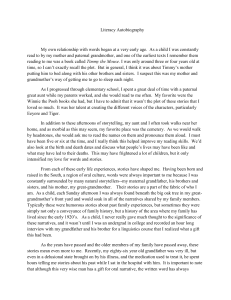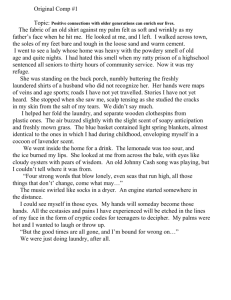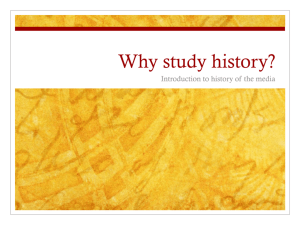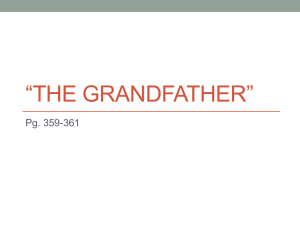THE GREAT PATRIOTIC WAR IN THE HISTORY OF MY FAMILY
advertisement
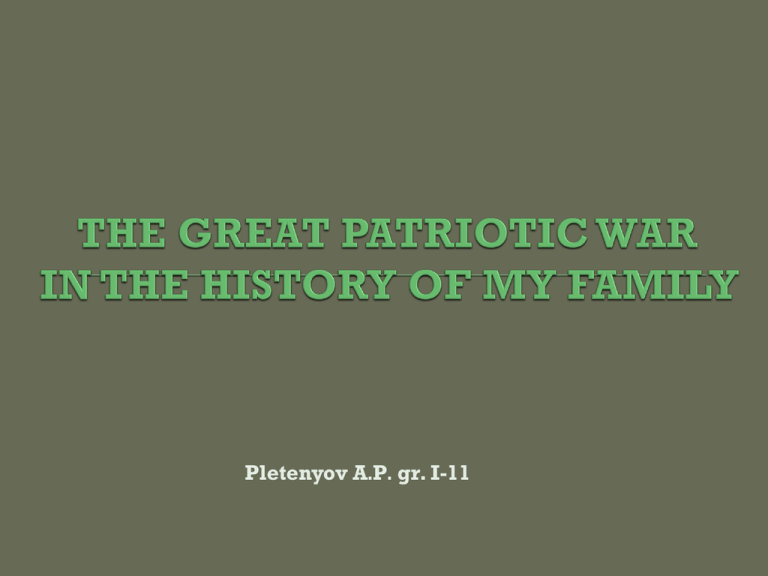
Pletenyov A.P. gr. I-11 My grandfather was born in 1910 in the village of Ilyinskoe, Nolinsk District, Vyatka Province. Before the revolution, he went to the parochial school of their village. The same church. Photo of 2007 Church of Elijah the Prophet in the village of Ilyinskoye. Photo of early XX century This photograph was taken while he served in the Leningrad militia in 19311934. (Up to 1960-s they served for 3 years in the Soviet Union). He had buttonholes with two "triangles" - the title, which meant squad leader, today it means simply Sergeant. After demobilization my grandfather finished the course of drivers. He worked in a provincial town of Krasnouralsk. In late 1939 he came back home to Ilyinskoye. My grandmother stayed there until 1941, working at the factory as a metal controller. In autumn – winter of 1939/40 (First Finnish war) my grandfather trained new recruits in Kyrchany, where rallying point was located. And then the war started ... The spring of 1939 in the history of my family was marked by the birth of their first child - a girl Lida. Her fate is similar to those of many pre-war children - she died during the war, apparently, because of hunger. Grandfather, grandmother with their daughter Lida, grandmother´s brother - Pre-war photo Probably my grandmother was the first to learn about the beginning of the war. At the end of the night shift early in the morning the entire staff of the factory was announced that the war had begun. People listened in silence about the beginning of the war The inscription on the picture: " a keepsake to Tonya”. 17 August 1941" At the beginning of the war my grandfather was sent to the North-Western Front, the Baltic states. Hardly had he reached the front line when he lost his friend, with whom he was mobilized from Nolinsk. He was killed on the railway platform during the airstrike. In the Baltic or Leningrad province grandfather was captured during the German offensive. Grandma said only that he was missing. At the beginning of the war, almost all the trains near the front were under attacks by German aircraft. And at the end of the war such trains were showered with flowers picked up in 12 countries of Europe ... The summer and autumn of 1941 were a tragedy for the Red Army. The whole regiments and divisions surrendered. Surrounded somewhere in the Baltics or Leningrad province my grandfather was unable to avoid captivity. . Estonian volunteers on the march Grandfather was held captive in the Latvian German forest processing factory as free labour. In the summer of 1944, along with his comrades my grandfather escaped. Three of their group were captured and hanged by the Estonian nationalists. But their team was successful. In late 1944 my grandfather was restored to his old rank. After that he participated in the liberation of the Baltics, in blocking and storming of Königsberg. My grandfather. April / May 1945. East Prussia My grandfather celebrated Victory Day in the occupation military forces in East Prussia. In the summer of 1945 my grandfather was transferred to the Far East, took part in the Kuril landing operation although did not participate in active combat operations because of the wounds. During the war my grandfather got 2 medals and 2 orders. He got another medal in 1950. He was injured twice. My grandpa, grandmother and I. Early 90's. Unfortunately my grandfather died in 1995, when I was 6 years old, so I know his stories only in the retelling of my father and grandmother. He did not like to talk about the war, so there are only three stories. The first story is about how they, the prisoners of war were escorted by "policemen" from whom he just got a kick butt in the back. The second story is about a 2-day march on foot and padded tank from which there was a smell of burnt flesh, and the third story is not a military one - my grandfather saw an elephant in the Moscow Zoo during the transfer to the Far East. That's it. In the presentation materials from personal photo collections, memories, and materials from Internet were used.
